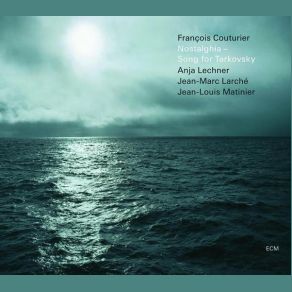Nostalghia - Song for Tarkovsky
Download links and information about Nostalghia - Song for Tarkovsky by François Couturier / Francois Couturier, Anja Lechner. This album was released in 2006 and it belongs to Jazz, Classical genres. It contains 12 tracks with total duration of 01:17:45 minutes.

|
|
|---|---|
| Artist: | François Couturier / Francois Couturier, Anja Lechner |
| Release date: | 2006 |
| Genre: | Jazz, Classical |
| Tracks: | 12 |
| Duration: | 01:17:45 |
| Buy it NOW at: | |
| Buy on iTunes $11.99 | |
| Buy on Amazon $11.49 | |
| Buy on iTunes $8.99 | |
Tracks
[Edit]| No. | Title | Length |
|---|---|---|
| 1. | Le Sacrifice | 8:59 |
| 2. | Crépusculaire | 13:20 |
| 3. | Nostalghia | 8:27 |
| 4. | Solaris I | 3:19 |
| 5. | Miroir | 3:21 |
| 6. | Solaris II | 2:47 |
| 7. | Andrei | 7:05 |
| 8. | Ivan | 6:14 |
| 9. | Stalker | 7:01 |
| 10. | Le Temps Scellé | 5:02 |
| 11. | Toliu | 8:24 |
| 12. | L'éternel Retour | 3:46 |
Details
[Edit]French pianist François Couturier was inspired by Soviet film director Andrei Tarkovsky (1932-1986) in creating the music on this album, but it should be noted at the outset that the album does not contain any music actually used in Tarkovsky's films in general or his 1983 movie Nostalghia in particular. Rather, Couturier, who states his admiration for Tarkovsky in his brief liner notes, saying that has "seen all his films over and over again," tried to evoke the mood of those films in writing these pieces of music, several of which share titles with them. Typically, Couturier also borrowed from several classical works, acknowledging that "Le Sacrifice" and "L'Éternal Retour" were "inspired by" Bach's Matthäuspassion; that "Nostalghia" and "Andrei" contain "references to" Alfred Schnittke's Sonata No. 1 for Violoncello and Piano; and that "Toliu" has "allusions to" Pergolesi's Stabat Mater. He took this music to three longtime musical compatriots, cellist Anja Lechner, soprano saxophonist Jean-Marc Larché, and accordionist Jean-Louis Matinier. The resulting quartet creates a free jazz/contemporary classical hybrid that will sound familiar to fans of the record label issuing the disc. "Song for Tarkovsky is a project that fits very naturally in ECM's soundworld," states a sentence in the album's press release, and that's certainly true. There are times, notably in the piano work in "Miroir," when one might be listening to an ECM Keith Jarrett album, with its haunting, echoed playing. The music arguably does evoke the style of Tarkovsky's filmmaking, particularly its contemplative tone and extremely long takes. But listeners don't have to be familiar with those movies to respond to it.